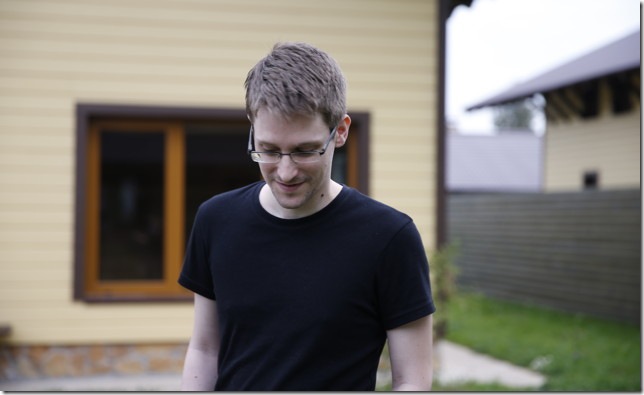Laura Poitras’ Citizenfour, about the revelations of Edward Snowden and her involvement in them, is a vital historical document. With the bulk of the film taking place in Hong Kong, where Poitras and Glenn Greenwald interviewed Snowden for a little more than a week in the summer of 2013, Citizenfour is a careful account of spy-novel-style machinations, journalistic ethics, and a day-by-day chronicle of a fundamental paradigm shift in the relationship between governments and the governed, especially in a “free democratic republic” such as the United States.
It’s important for all of these reasons, and yet, somehow, it’s not a very good movie.
Citizenfour is Poitras’ final film in a trilogy about the implications of post-9-11 America, following My Country, My Country (about elections in occupied Iraq) and The Oath (which analyzed the Guantanamo Bay policies through the prism of two men tangentially connected to Osama bin Laden). Citizenfour takes its title from the anonymous codename Snowden used when he first contacted Poitras about releasing NSA documents to the media.
It was originally intended to focus on a spate of whistleblowers, including William Binney, a similarly courageous, if lesser known, revealer of NSA secrets. But when the gravity of Snowden’s situation takes hold, he essentially hijacks the movie’s narrative, resulting in a shapeless meander that feels, all the way through its denouement, like a work in progress.
Scenes of pre-Snowden tension-building involving an underground meeting of Occupy protesters, and a preliminary 9th Circuit Court of Appeals hearing about the NSA’s mass proliferation of phone records, are fascinating and insightful, but once Snowden enters the picture, they drop off, ne’er to be revisited. An hour or so of film time later, after Snowden has vacated Hong Kong for good, other key figures in the battle between privacy and security — like journalist Jeremy Scahill and WikiLeaks founder Julian Assange — emerge like token cameos, or like teasers from their own documentaries.
As for the rest of the movie, we’re sequestered, with Snowden, in the comfortable confinement of an antiseptically white Hong Kong hotel room, witnessing a healthy fraction of the dozens of hours of interviews between himself and Greenwald. For his part, Snowden comes off as a well-spoken, passionate, ideally conscientious objector to NSA policies. He is convincing when he calls his former employer’s data mining the “greatest weapon of oppression in the history of man” and seems genuine in his selfless motivations to alert the world media at the expense of his livelihood, his well-being, his family.
But in maintaining such a close kinship with Snowden, Poitras fails to see the forest through the trees. Instead of framing the issues Snowden raises with the proper amount of context — not to mention rage — she continues to linger in Snowden’s room, dramatizing a standstill. Watching somebody type e-mails, watch television and groom himself just isn’t very interesting, even when the person doing them happens to be the most wanted American citizen on the planet.
As George Packer explained in a recent New Yorker profile of Poitras, she couldn’t help becoming part of the Snowden saga herself, relocating permanently to Berlin in order to avoid increasing government harassment of her life and possessions. She reveals this in Citizenfour, but only through intertitles, as if wary of inserting herself in the movie’s drama, even when it warrants her direct involvement. Not every documentary filmmaker should be Michael Moore, doubling as its movie’s pied piper and marquee star. But relegating herself to the wallpaper — or at most a fly on that wallpaper — does a disservice to her own role in the film’s subject.
Citizenfour does offer some cogent arguments against the government’s encroachments on privacy, for the benefit of those docile Americans who still believe that if they’re compliant citizens with nothing to hide, then what’s the big deal? It presents a government infrastructure right out of Orwell’s darkest fantasies, headed by officials who speak in proven mistruths, like Keith Alexander and James Clapper. Barack Obama, in the few seconds of TV footage he is granted in Citizenfour, comes off as transparently callow and dishonest, as he has been from the beginning on issues of secrecy.
But I can’t help feeling all of this will fall solely on the ears of the already convinced. Aside from the knotty journalistic issues involved with the Snowden scoop — how Poitras contacted him and vice versa, how she found him in Hong Kong, if and when she and Greenwald would reveal his name of the public — there is very little new information in Citizenfour. For the already clued-in, it’s a worthwhile review of recent events, and for the uninitiated, it insufficiently describes the gravity of Snowden’s leaks. So it’s stuck in a kind of awkward, identity-less limbo, like a whistleblower in a Moscow terminal.
CITIZENFOUR. Director: Laura Poitras; Cast: Glenn Greenwald, Edward Snowden, Ewan MacAskill, William Binney; Distributor: Radius-TWC; Rating: R; Opens: Now at Living Room Theaters at FAU, Boca Raton
